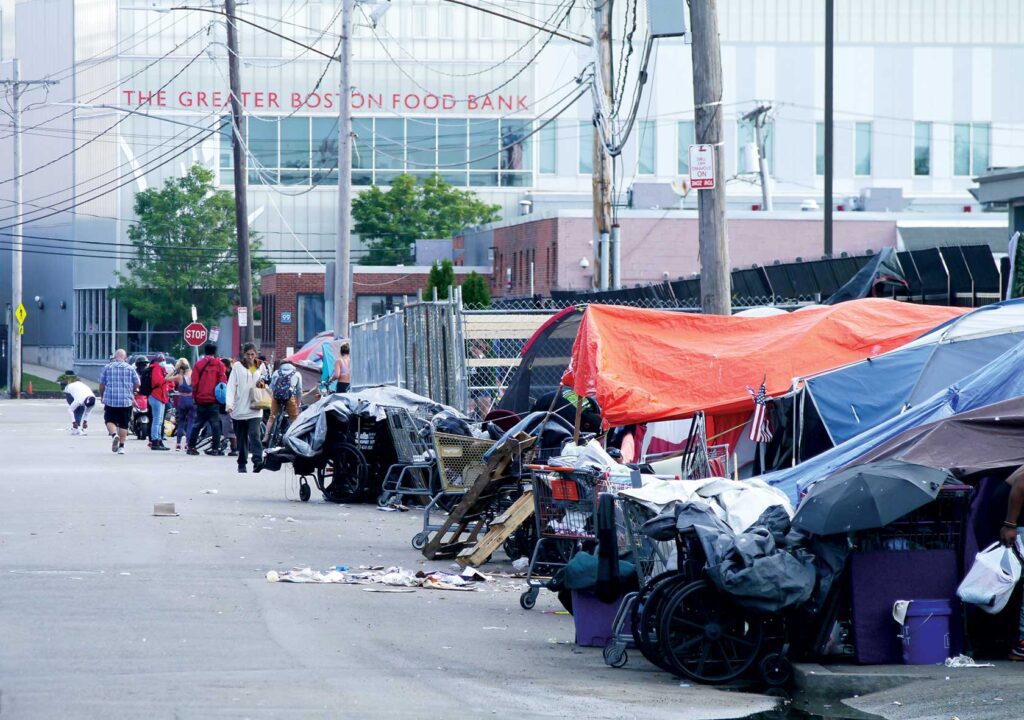
Boston Mayor Michelle Wu has announced a “major phase change” in the city’s strategy for the tent encampment of opioid users near the intersection of Massachusetts Avenue and Melnea Cass Boulevard.
Having campaigned against criminalization, Wu has shifted from a heavy reliance on harm reduction to also addressing immediate public safety threats that have caused some outreach workers to pull back from the area.
Boston’s plans for this fall rely more than previously on law enforcement. To coordinate, police will temporarily take up posts alongside the civilian service providers who remain. The mayor has asked the City Council to authorize new police powers to clear Atkinson Street, the site of a resilient encampment.
At an Aug. 25 news conference, Wu referred to “the city of Boston’s so-called law enforcement sweeps in the past that have not been successful.” Such sweeps were conducted under former mayor Marty Walsh and former acting mayor Kim Janey.
“This is also not the solution to the opiate crisis or homelessness,” Wu maintained. “This is necessary for the public safety, health and well-being of all.”
Police Commissioner Michael Cox explained that police action will only take place “when the city is able to provide access to available shelter.” The South End is to add 30 beds for any newly displaced people.
“Without the ordinance,” he said of the mayor’s proposal, “our policy requires 48-hour notice to remove tents and tarps outside of voluntary street cleaning.”
Wu attempted to preempt criticism on civil liberties grounds.
“This would only apply to individuals who have already been offered adequate housing and shelter, who have also been offered transportation to that shelter and who have been given the opportunity to store their personal belongings,” she said.
With additional permanent postings, police officers will also deploy in response teams around nearby neighborhoods to counter displaced drug-dealing. Cox reassured citizens “we’re going to have officers in mobile units” empowered by the proposed ordinance “to stop the structures and tents from reoccurring in neighborhoods.”
“I know people may be fearful that it’s going to come to their neighborhood,” acknowledged Boston’s top cop, “but, the reality is we are going to be in every neighborhood just to make sure that doesn’t occur.”
At a well-attended community meeting for Roxbury residents two days earlier, community speakers were doggedly optimistic, saying action was overdue. Many offered plaudits to public service, police and nonprofit workers for engaging the population.
At the virtual meeting, attended by five city councilors and a state representative, two mayoral aides fielded most of the questions: Director of Coordinated Response Tania Del Rio and Dr. Bisola Ojikutu, executive director of the Boston Public Health Commission.
City Council President Ed Flynn proposed more city services, police and public works. He identified Roxbury, the South End, South Boston and Dorchester as priorities.
Del Rio pointed out “other hotspots exist,” mentioning Zeigler Street, Nubian Square and Blair Lot, all in Roxbury.
Deputy Police Superintendent Pam Harris cited the exhaustion of officers working the area, but said the force was ready anyway.
“At night,” she later added, “BPD is typically the only ones out there.”
Renarda Huggins, an author, acknowledged officers’ exhaustion and called for support until the bridge to Long Island is rebuilt and services reopen there. “But at the same time, those are the trained individuals, and this is their job,” she said.
In response, Del Rio and Harris pointed to outreach activities and an increased number of arrests.
Describing a “revolving door” in the courts, Del Rio said, “The police commissioner as well as his staff are in conversation with the court system.”
Low bail leads to quick release, she explained, and, as a result, offenders “are simply being returned faster than the officers can complete the paperwork.”
Harris said, “The courts — we understand they are being sympathetic, but we have witnessed a revolving door with offenders.”
“We don’t want to overburden the court with users,” she added, distinguishing them from bad actors. “It would be unreasonable for us to go arrest everyone sitting on a curb shooting a needle up.”
Speaking from Clifford Playground next to the city Health Commission’s offices, Domingos DaRosa, coach of the Boston Bengals youth football team, documented encampments that resurfaced after a police presence departed.
Valerie Madden of Roxbury said it is “ridiculous to try and get through” crowds loitering in front of South Bay’s supermarket.
Del Rio replied that “South Bay is on the daily route for BPHC outreach services” twice daily.
“Tough one,” said South End building owner Steven Godfrey of the policy dilemma. For him, “the enforcement piece is not the answer.”
A few suggested answers could be found in Lisbon, Portugal, where all drugs are legal. Others questioned why existing laws were not enforced.
Asked about seeking an emergency declaration from Healey, Ojikutu answered it wouldn’t improve funding or offer new authority.
“In Nubian Square, we can’t take it anymore,” said Haris Hardaway, a business owner. “At the end of the day, when the rent has to get paid, no one cares if someone was in recovery, and you couldn’t get customers to come to your business.”
Hardaway called for a balanced policy approach, because, he said, “enforcement is needed.”







